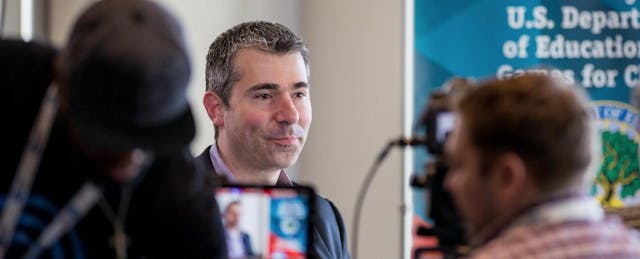Like a mad scientist, Richard Culatta is never short on energy or ideas. At his office in Providence, R.I., where he is the state’s chief innovation officer, there’s a whiteboard of ideas that he hopes the department will take on in the next few years. “There is so much more that needs to be done,” says Culatta, who previously served as Director of the Office of Educational Technology at the U.S. Department of Education.
But those plans will have to wait—or at least find a new advocate turn into reality. Just over a year since returning to his home state of Rhode Island, Culatta is now leaving to join the International Society for Technology in Education (ISTE) as the membership organization’s newest chief executive.
“It was time for me to hand off the baton,” says Culatta on his decision to move from government posts to the CEO chair. And although his last two high-profile posts have been government-focused, Culatta says he isn’t abandoning the sector. Instead, he says he hopes his new role will allow him to bridge communities and institutions—whether they be public offices, private companies or some combination. “ISTE is a great neutral party to call those people together,” he says.
Culatta is leaving behind a laundry list of ideas for his successor, including work around how the state can better use data to improve the lives of foster-care children and their families. But he’s also proud of his accomplishments during his short 15-month stint. In particular, he says he’s excited about the work Rhode Island has done to bring computer science education to schools. “We took a state that was last in the country to offer computer science and now we are the first to offer the subject in nearly every school,” Culatta says.
He also headed-up a statewide personalized learning initiative, and was a driver behind Rhode Island’s open textbook initiative, which encourages colleges to use open-licensed textbooks. One of the open textbook initiative’s main goals, which launched in 2016 and now has all 11 Rhode Island institutions signed on, is to save students $5 million over the next five years. “The cooperation we have to do that is so exciting,” he says.
But how will the once-government guru fare in the nonprofit sector? One of the biggest areas he hopes to tackle as the organization's head honcho is to blur the silos between innovators and educators, and better share solutions that already exist or are in the works around the country. “ISTE has an international presence, a huge following and a dedicated member base. But how can we do a better job of lining up opportunities to members with their expertise? There is an opportunity for ISTE to broker these opportunities.”
One way to do that, he says, is to spur new conversations and questions that he “doesn’t see happening at the level they need to.” (Such as, he says, “how are we looking at technology to close equity gaps? How are we looking at next-gen teacher prep programs? How are we looking at higher ed in general?”) In particular, Culatta wants to see some fresh ideas around the organization’s legacy annual conference, which draws more than 16,000 attendees from around the world. No, he isn’t trying to ditch one of the country’s largest edtech convenings. But he does want to see some alternatives.
“[ISTE] has a single event, but these conversations are focused enough that they deserve a separate gathering outside of our conference,” says Culatta. Smaller, more focused conferences don’t necessarily mean another trip to San Antonio, where this year’s event will be held. Instead, he wants to explore more opportunities to serve members who interact online and the potential to create virtual conferences or meetup spaces.
“[ISTE] has a vibrant set of online communities where people can connect and engage that doesn't have to require coming together in a physical space,” he explains. “What would it look like to tackle these problems from different angles, but also different places?”
Culatta will officially start his new gig at ISTE on May 1, the day after he leaves his office in Rhode Island. He’ll be taking over for interim chief Cheryl Scott Williams, who stepped in after ISTE’s previous CEO Brian Lewis left last September.


